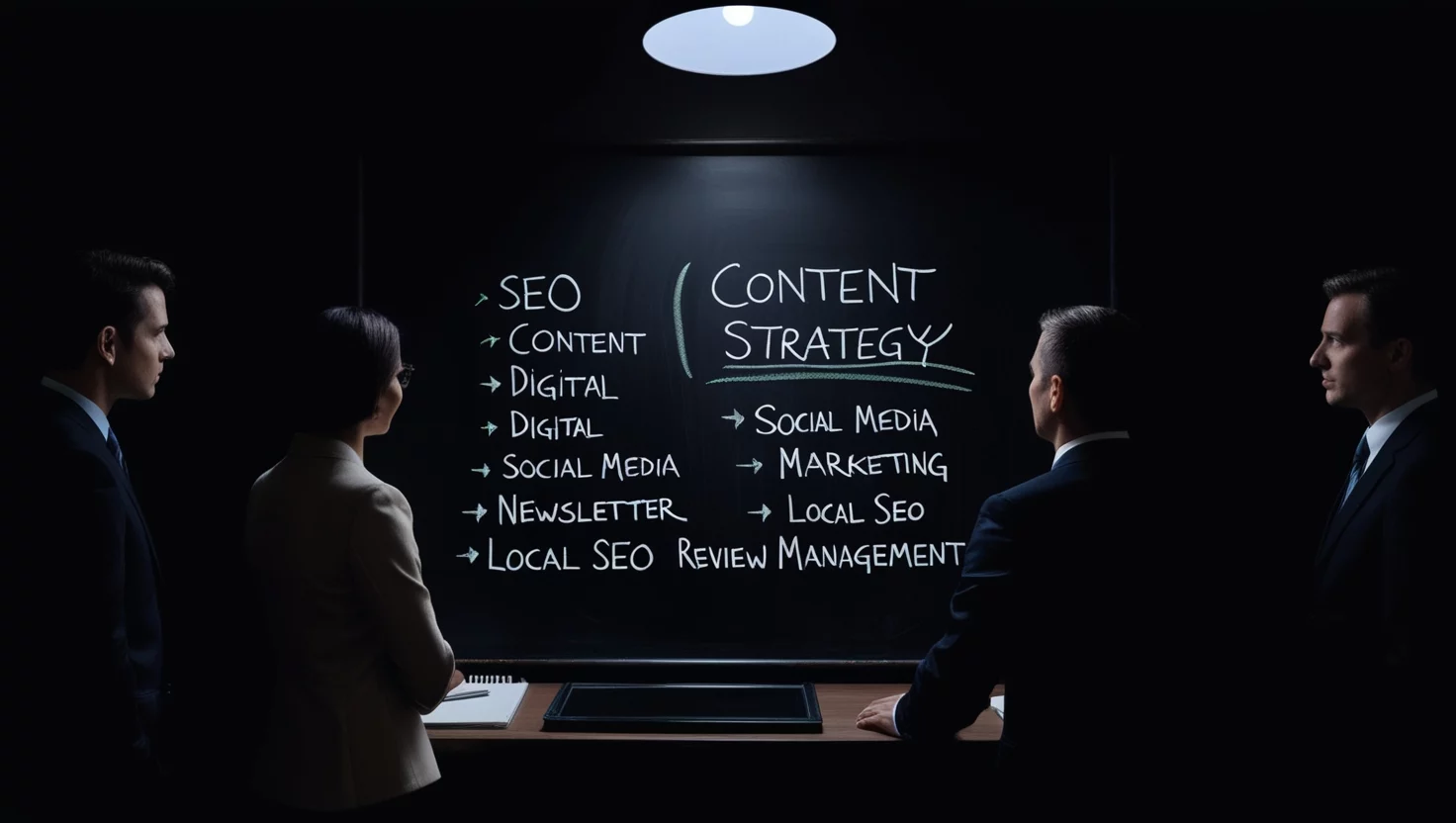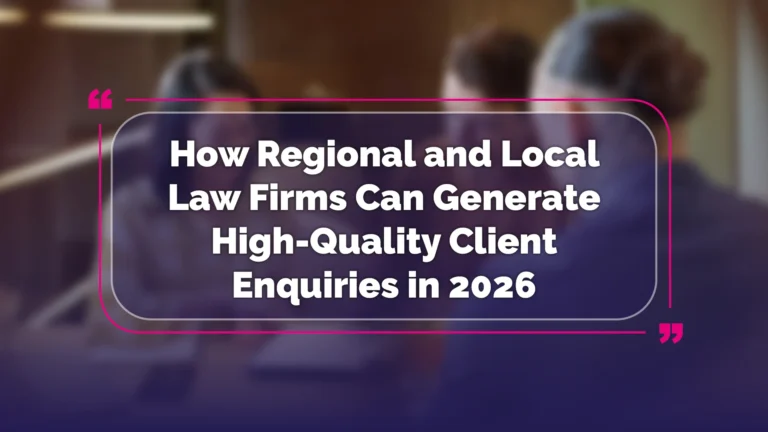Strengthening Client Relationships and Building a Future-Ready Legal Marketing Strategy
Imagine losing 20% of your clients this year—not to a competitor’s superior legal skills, but simply because they felt undervalued. In the cutthroat legal landscape of 2025, your law firm’s survival hinges on more than just winning cases. It’s about winning hearts, anticipating needs, and transforming client interactions from transactional to transformational.
The legal marketplace is undergoing a seismic shift. Traditional marketing approaches are crumbling, replaced by data-driven strategies that prioritise deep, meaningful client relationships. Those law firms that master this new terrain won’t just survive—they’ll dominate. This isn’t about flashy advertising or empty promises. It’s about creating a client experience so compelling that your firm becomes indispensable.
In this blog, we’ll dive into five game-changing strategies that will revolutionise how law firms approach digital marketing in 2025. From leveraging cutting-edge technologies to creating personalised client journeys, you’ll discover how to turn your current client base into your most powerful marketing asset. Get ready to transform your firm’s approach and leave your competition in the dust.
Key Highlights
- Maximise Client Retention: Transform your communication from routine to remarkable. Craft multi-channel engagement strategies that turn one-time clients into lifelong advocates, using targeted email campaigns, personalised videos, and strategic touchpoints that make clients feel truly valued.
- Personalised Engagement: Move beyond generic interactions to create bespoke client experiences. Develop intelligent relationship-mapping techniques that not only address immediate legal needs but anticipate future challenges, turning each interaction into an opportunity for deeper connection.
- Predictive Marketing: Harness the power of data intelligence to become proactive, not reactive. Use advanced analytics and client insights to predict legal challenges before they emerge, positioning your firm as a strategic partner rather than just a service provider.
- Future-Proof Content Strategy: Become the thought leader that clients can’t ignore. Develop forward-looking content that doesn’t just reflect current legal landscapes, but shapes future conversations, demonstrating your firm’s visionary approach and deep industry expertise.
- Effective Client Retention and Referrals: Build a self-sustaining ecosystem of trust and recommendation. Design systematic referral programs and testimonial strategies that organically amplify your law firm’s reputation, transforming satisfied clients into your most powerful marketing channel.
Strategy 1: Remarketing to Your Existing Clients
While law firms often prioritise acquiring new clients, your current client base is an untapped goldmine. Clients who’ve had a positive experience with your law firm are far more likely to return for additional services. Remarketing not only strengthens trust but also offers a cost-effective way to increase lifetime client value.
1. Email Marketing: A Cost-Effective, Direct Connection
Email marketing remains a powerful tool for engaging your client base. Here’s how to use it effectively:
- Thank-You Emails: A simple, personalised thank-you email after completing a case can leave a lasting impression and foster goodwill.
- Cross-Selling Opportunities: For example, a conveyancing client may benefit from wills and probate advice. Tailored emails can highlight complementary services.
- Legal Updates: Keep clients informed of relevant law changes, such as inheritance tax updates or landlord-tenant law revisions.
2. Newsletters: Building Long-Term Engagement
Newsletters are perfect for staying connected and building trust over time. Include:
- Educational Articles: Simplify complex legal topics, such as estate planning or probate processes.
- Success Stories: Share anonymised case studies (with consent) to showcase your expertise.
- Updates from Your Law Firm: Humanise your brand with stories about new hires, community involvement, or partnerships.
3. Video Marketing: Engage and Educate
Video content is highly engaging and accessible, making it an excellent tool for connecting with clients. Create:
- Thank-You Videos: Personalise client interactions with a short, heartfelt message.
- Explainer Videos: Simplify legal jargon by breaking down complex processes like probate or dispute resolution.
- Seasonal Reminders: For instance, a video encouraging clients to review their wills before the end of the tax year.
4. Physical Mail: A Memorable Touch
In the digital marketing age, physical mail offers a unique way to stand out. Use it to:
- Send holiday or anniversary cards to show appreciation.
- Distribute brochures highlighting your services.
- Share QR codes linking to exclusive resources or offers.
Remarketing fosters loyalty, ensuring your clients think of your law firm first when they need legal services.
Strategy 2: Using Data to Anticipate Client Needs
Harnessing data allows your law firm to shift from reactive to proactive marketing. By analysing past trends, you can anticipate client needs and position your law firm to meet them before competitors.
1. Identify Client Behaviour Patterns
Your firm’s data reveals trends that can inform your marketing efforts. Examples include:
- Probate Enquiries: If these peak in January, start marketing related services in December.
- Conveyancing: If spring and summer drive demand, ramp up promotions in February.
- Divorce Cases: If these increase post-summer, launch relevant campaigns in August.
These insights enable you to align marketing efforts with client demand.
2. Proactive Content Creation
Firms that publish content ahead of trends stand out. To stay ahead with proactive content marketing:
- Create Seasonal Content: Post blogs, videos, or social updates before the demand surges.
- Optimise for SEO: Use keywords your audience searches for during specific times of the year.
- Run Targeted Ads: Deliver ads with timely, relevant offers on platforms like Google or LinkedIn.
3. Personalise the Client Journey
Use data to tailor digital marketing to individual clients. For instance:
- Send reminders to clients who haven’t updated their wills in three years.
- Share landlord-tenant dispute advice with clients who recently purchased a rental property.
4. Leverage Technology for Insights
Customer relationship management (CRM) tools and analytics platforms can transform your data into actionable insights. These tools allow you to:
- Track and analyse client interactions.
- Segment audiences based on service history or geography.
- Automate personalised communications to save time and resources.
Data-driven marketing positions your firm as proactive, knowledgeable, and client-focused.
Strategy 3: Building a Strong Online Presence
A professional, well-optimised online presence is critical for attracting and retaining clients in 2025. Here’s how to make your firm stand out online:
1. Your Website: The Digital Storefront
Your website is often the first impression potential clients have of your firm. Key elements include:
- Mobile Optimisation: With most users accessing websites via mobile devices, ensure your site is responsive and fast-loading.
- Clear Call-to-Actions (CTAs): Encourage visitors to contact you with visible CTAs like “Schedule a Free Consultation” or “Download Our Guide.”
- Client Testimonials: Showcase positive reviews prominently to build trust.
- SEO Best Practices: Use relevant keywords to improve search rankings. For example, “family law services in [City Name]” can help attract local clients.
2. Local Search Optimisation
Optimising for local search ensures your firm appears in Google’s “Map Pack” and local search results in your practice area. Key steps include:
- Verifying and optimising your Google Business Profile.
- Encouraging satisfied clients to leave reviews.
- Ensuring consistent Name, Address, and Phone (NAP) information across all platforms.
3. Social Media Marketing
Social media platforms like LinkedIn and Facebook provide excellent opportunities to connect with your audience. Tips include:
- Sharing client success stories, legal tips, and industry updates.
- Running targeted ads to reach specific demographics.
- Engaging with your audience through comments and direct messages.
Strategy 4: Client Retention and Referrals
Retaining clients and encouraging referrals can dramatically amplify your marketing efforts. Happy clients are your best advocates. Here’s how to cultivate loyalty:
1. Deliver Exceptional Service
Satisfied clients are more likely to return and refer others. Go above and beyond by:
- Providing regular updates on their case.
- Responding promptly to queries.
- Demonstrating empathy and professionalism in every interaction.
2. Encourage Reviews and Testimonials
Online reviews are essential for building credibility. Encourage clients to:
- Leave a review on Google or legal directories like Law Society’s Find a Solicitor.
- Share their positive experiences on social media.
3. Create a Referral Program
Offer incentives for client referrals, such as discounts on future services or charitable donations in their name.
Strategy 5: Leveraging Technology for Digital Marketing Success
In the rapidly evolving landscape of legal marketing, embracing technology is no longer optional—it is essential. From automating routine tasks to gaining deeper insights into client behaviour, technology offers a plethora of tools to elevate your marketing strategies and efficiency. Here’s how your law firm can harness technological advancements to stay ahead in 2025:
1. AI-Powered Chatbots: Enhancing Client Engagement
Artificial intelligence has significantly advanced in recent years, with chatbots now offering seamless, round-the-clock client support. These tools can:
- Answer Common Queries: Provide instant responses to frequently asked questions, such as case status updates or service availability.
- Qualify Leads: Gather preliminary client information, ensuring that only serious inquiries reach your team.
- Schedule Appointments: Automate the booking process, streamlining client interactions and saving administrative time.
By integrating AI chatbots into your website, you ensure that potential clients are never left waiting, enhancing their experience and improving conversion rates.
2. Marketing Automation: Streamlining Your Efforts
Automation tools are a game-changer for firms looking to optimise their marketing campaigns. Platforms like HubSpot and Mailchimp enable you to:
- Personalise Email Campaigns: Use client data to craft targeted messages tailored to specific needs, such as reminders for will updates or promotions for seasonal services.
- Schedule Social Media Posts: Plan and publish content across platforms, ensuring consistent engagement without the need for daily oversight.
- Trigger Communications: Automate follow-ups based on client actions, such as downloading a guide or submitting an enquiry.
The result is a more consistent, efficient, and personalised approach to client engagement.
3. Analytics Tools: Driving Data-Driven Decisions
Understanding your marketing performance is critical for making informed decisions. Tools like Google Analytics, SEMrush, and Ahrefs provide insights into:
- Website Traffic: Monitor visitor behaviour, identify high-performing pages, and optimize underperforming areas.
- SEO Performance: Track keyword rankings, backlinks, and organic search trends to refine your strategy.
- Campaign Effectiveness: Measure the success of email, social media, and PPC campaigns, adjusting tactics as needed.
By leveraging analytics, you can continuously refine your marketing efforts to maximise ROI.
4. Client Relationship Management (CRM) Systems: Strengthening Connections
A robust CRM system, such as Salesforce or Clio Grow, is invaluable for managing client relationships. These tools enable you to:
- Segment Your Audience: Organise clients by case type, location, or service history, allowing for targeted outreach.
- Track Interactions: Maintain a detailed record of communications, ensuring no touchpoint is missed.
- Automate Follow-Ups: Schedule reminders for important dates, such as anniversaries of case completions or deadlines for legal updates.
CRM systems streamline workflows and enhance client satisfaction by fostering a more personalised experience.
Conclusion: A Winning Formula for 2025
In 2025, law firms that invest in remarketing and predictive marketing will lead the pack. By focusing on building long-term relationships with current clients and leveraging data to anticipate future needs, your firm can build a loyal client base that drives consistent growth. With a strong online presence and the effective use of technology, your firm can also stay ahead of the curve and respond quickly to changing market demands. Start implementing these strategies today, and you’ll be well on your way to achieving greater success in the coming year.
Take the First Step Toward Marketing Success
Ready to future-proof your legal marketing? Our expert team is here to help. Whether you need email campaigns, SEO optimisation, or data-driven insights, we’ll craft a strategy tailored to your firm’s needs. Contact us today to schedule a consultation and discover how you can transform your marketing in 2025.
Let us help you unlock your firm’s potential and secure your position as a leader in the legal industry. The future of law firm marketing is here—don’t get left behind.
Frequently Asked Questions: Law Firm Marketing in 2025
Q1: How much should a law firm invest in marketing? Typically, law firms should allocate 2-5% of their total revenue to marketing efforts. However, the key isn’t just spending money, but spending it strategically. Focus on high-ROI tactics like targeted digital campaigns, content marketing, and personalised client engagement initiatives that directly contribute to client retention and acquisition.
Q2: Are traditional marketing methods still effective for law firms? Traditional methods are declining, but not obsolete. The most successful firms now blend traditional approaches with digital strategies. Networking events, referral programs, and print materials can still be effective when integrated with data-driven digital marketing techniques like personalised email campaigns, targeted social media advertising, and thought leadership content.
Q3: How often should we communicate with existing clients? Aim for meaningful, value-added touchpoints every 4-6 weeks. This doesn’t mean constant selling, but providing genuine value—such as industry insights, legal updates relevant to their business, or personalized check-ins that demonstrate your proactive approach to their legal needs.
Q4: What digital tools can help improve client retention? Consider implementing:
- Client relationship management (CRM) software
- Email marketing platforms with segmentation capabilities
- Analytics tools to track client engagement
- Automated communication systems
- Client feedback and survey tools
Q5: How can smaller law firms compete with larger firms in marketing? Smaller firms can excel by:
- Developing highly specialised, niche expertise
- Creating more personalised client experiences
- Leveraging local networks and community connections
- Producing high-quality, targeted content
- Using cost-effective digital marketing strategies
Q6: What metrics should we track to measure marketing effectiveness? Key metrics include:
- Client retention rate
- Net promoter score
- Client lifetime value
- Referral rate
- Conversion rates from marketing campaigns
- Engagement rates on content and communications
Q7: How important are client testimonials and reviews? Critically important. In 2025, 87% of clients read online reviews before engaging a law firm. Systematically collecting, curating, and showcasing genuine client testimonials across multiple platforms can significantly boost your firm’s credibility and attract new business.
Q8: How do we personalise marketing for different client segments? Segment clients based on:
- Industry
- Legal needs
- Company size
- Previous interaction history
- Potential future requirements
Use data analytics to create tailored communication strategies, content, and service offerings for each segment.




